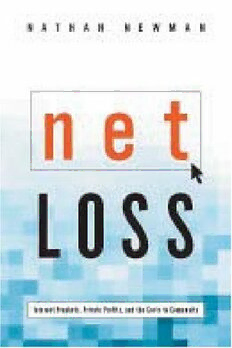
Net Loss: Internet Prophets, Private Profits, and the Costs to Community PDF
421 Pages·2002·1.388 MB·English
Most books are stored in the elastic cloud where traffic is expensive. For this reason, we have a limit on daily download.
Preview Net Loss: Internet Prophets, Private Profits, and the Costs to Community
Description:
"Nathan Newman has written a fascinating history of the Silicon Valley that chronicles the federal government?’s leading role in creating, and then privatizing, the Internet. Net Loss not only dispels the myth that the Internet emerged full-blown as a result of entrepreneurial risk in a competitive marketplace, but also explains in depth how forces of globalization have undermined regional economies in California while reshaping social and political life in local communities. This groundbreaking book is a must read for anyone concerned with the power of global corporations and the future of democratic governance."?—Scott Bowman, California State University, Los Angeles "Net Loss is the perfect antidote for the confusion generated by the years of hype and the recent disillusionment surrounding the Internet economy. Nathan Newman offers a cogent and original analysis of what the Internet has really meant to the regional economy of the Silicon Valley as well as to other regions. Anyone in search of fresh ideas carefully grounded in a rich base of research will find this book just what they have been looking for."?—Peter Evans, University of California, Berkeley How has the Internet been changing our lives, and how did these changes come about? Nathan Newman seeks the answers to these questions by studying the emergence of the Internet economy in Silicon Valley and the transformation of power relations it has brought about in our new information age. Net Loss is his effort to understand why technological innovation and growth have been accompanied by increasing economic inequality and a sense of political powerlessness among large sectors of the population. Newman first tells the story of the federal government?’s crucial role in the early development of the Internet, with the promotion of open computer standards and collaborative business practices that became the driving force of the Silicon Valley model. He then examines the complex dynamic of the process whereby regional economies have been changing as business alliances built around industries like the Internet replace the broader public investments that fueled regional growth in the past. A radical restructuring of once regionally focused industries like banking, electric utilities, and telephone companies is under way, with changes in federal regulation helping to undermine regional planning and the power of local community actors. The rise of global Internet commerce itself contributes to weakening the tax base of local governments, even as these governments increasingly use networked technology to market themselves and their citizens to global business, usually at the expense of all but their most elite residents. More optimistically, Newman sees an emerging countertrend of global use of the Internet by grassroots organizations, such as those in the antiglobalization movements, that may help to transcend this local powerlessness.
See more
The list of books you might like
Most books are stored in the elastic cloud where traffic is expensive. For this reason, we have a limit on daily download.
